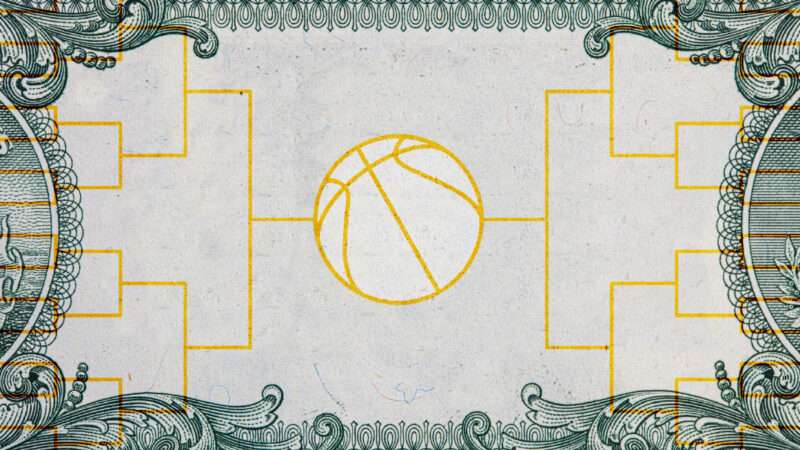
The annual March Madness college basketball tournament has long been associated with sports betting, thanks to ubiquitous but technically illegal bracket pools in offices and bars. But this year’s tournament was different.
Because of the COVID-19 pandemic, the entire event was played in Indiana. It was the first time that the NCAA had held any part of its biggest annual event in a state with legal sports betting—a reversal from previous NCAA policy. That’s a big deal not because of what happened but because of what didn’t.
This year’s NCAA basketball tournament, which concluded on April 5 with Baylor University claiming its first national championship by throttling previously undefeated Gonzaga University, was not marred by scandal or corruption. There were no reports of thrown games or bribed refs. Contrary to the fears underlying the NCAA’s longstanding policy, the first major intersection of college basketball and legal sports betting seems to have been a completely clean affair.
For years, anti-gambling scolds warned that legal betting would be a disaster for sports leagues and especially for college athletics. Because college players are unpaid amateurs, the argument went, they would be easy marks for bookmakers trying to influence game outcomes.
“Professional and amateur sports leagues need to recognize that legalized sports gambling will put both the lives and livelihoods of their athletes at risk,” John Kindt, a University of Illinois business administration professor who has testified against legalized gambling in multiple states, warned in 2018. That was just before the U.S. Supreme Court struck down a 1992 federal law that effectively banned sports betting outside of Nevada. Maintaining that ban, he argued at the time, was a “national imperative.”
The longtime Washington Post sports columnist Thomas Boswell worried that legal sports betting would “turn our arenas, stadiums, and ballparks into new kinds of casinos.” The “most disgusting” part, he wrote in a 2018 column, was that “sports-gambling pushers will come right out in daylight, not even pull a gun, and say that they would love to assist in creating a world” where you can bet on everything from the outcome of a game “to whether the next free throw will be made or not.”
You couldn’t quite do that during the Baylor-Gonzaga national title game in April. But some legal sportsbooks accepted bets on how many three-point shots the two teams would make. No guns were involved in those legal and voluntary transactions.
Gambling has always been a part of sports, and black-market bookmakers have played a role in some of the worst scandals in athletic history, from the infamous “Black Sox” who threw the 1919 World Series to the NBA games marred by corrupt referee Tim Donaghy, who was busted in 2007 for a long history of fixing matches. But rather than creating more opportunities for such skulduggery, legalized sports betting likely helps ensure the integrity of the games.
During this year’s March Madness, for example, the NCAA and the Indiana Gaming Commission worked with third-party vendors to track betting patterns and identify “irregularities” that might indicate something amiss. The data necessary to do that aren’t available when gambling takes place in black markets.
“There is nothing criminals like more than a large, unregulated betting market where they can prey on vulnerable people who have no other options,” says Michelle Minton, a senior fellow at the Competitive Enterprise Institute who studies vice issues. “It really isn’t surprising that bringing sports betting out from under the rug hasn’t led to increased problem gambling, corruption, or crime.”
Someday there will inevitably be another scandal involving sports betting. But the rapid expansion of legal betting—26 states and Washington, D.C., now allow it, just three years after the federal ban was struck down—has set up a massive, real-world experiment in the legalization of behavior that was previously forbidden in nearly every state.
What if we gave Americans more freedom and nothing bad happened? That’s a bet more politicians should be willing to make.
from Latest – Reason.com https://ift.tt/3pajT8P
via IFTTT